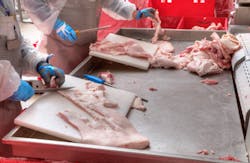New Zealand company develops method for real-time meat contamination detection
A New Zealand biotechnology company has announced that it has developed a method that allows processing firms to receive real-time results from meat contamination tests, according to New Zealand’s The Press. Christchurch-based start-up Veritide explained that its technology was a step forward from conventional testing methods, which usually take days before results are ready, thus saving time and costs. During the development stage, Veritide collaborated with meat producer ANZCO.
However, it is still not clear when the technology will be available to the meat processing industry, as Veritide is currently busy with field tests and usability trials, but it is estimated that the first prototype could be completed within the next six months. Despite not being available on the market, the meat contamination test was recently shortlisted as a finalist in New Zealand’s Hi-Tech awards.
Before venturing into food processing technology, Veritide used to specialize in manufacturing equipment to detect bioterrorism-associated contaminants, such as anthrax and ricin. According to the firm’s chief executive Craig Tuffnell, the transition seemed like a natural progression. Veritide had long considered the idea of designing a method to detect bacteria on meat and the ambition finally became reality thanks to favorable circumstances in the company. It received the support of a new investor that enabled the recruitment of skilled and experienced workers and it soon became clear that the opportunities that an effective meat contamination testing technology opened were immense.
RELATED: Safety key for meat processing plants
Tuffnell believes that initially the technology will find its market among individual meat processors, but he hopes that later on the method would be incorporated in the food processing equipment manufacturing channels and even lab equipment channels. The device would be small in size and portable and the technology it uses relies on fluorescence to display results instantly, so that virtually real-time information is received, he explained.
Demand for such technology would be great in the United States and Europe, with as much as $1 billion worth of spoiled meat annually detected in the former alone. Approximately 500 million swab tests are carried out on food in the United States and Europe every year, adding up to about $5 billion to $8 billion, Tuffnell pointed out.
Veritide aims to further improve the method, so that it becomes suitable for different applications. For instance, the technology might be enhanced to detect fecal contamination and to differentiate between different types of bacteria, as well as to check for contamination on various food products and other surfaces, Tuffnell noted. The firm will also try to attract more investors to raise additional capital and continue delivering innovative solutions to the processing industries, he said.
